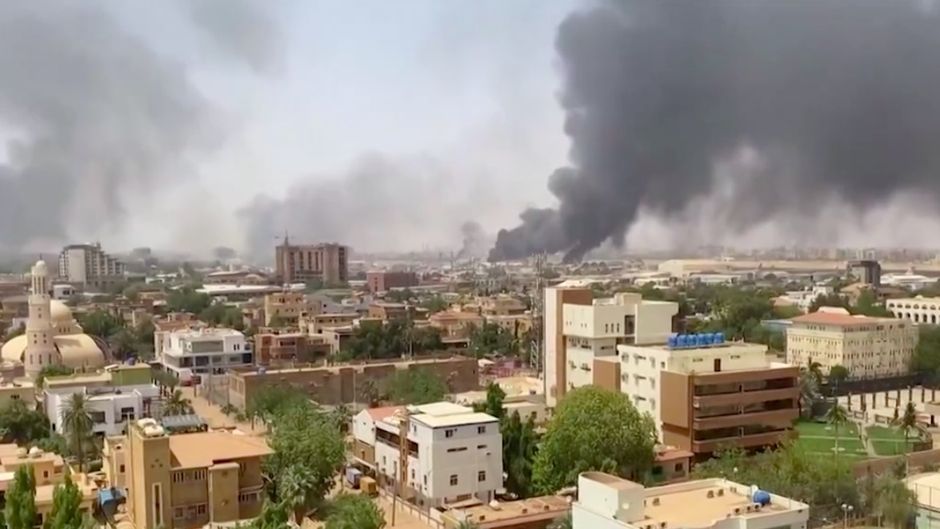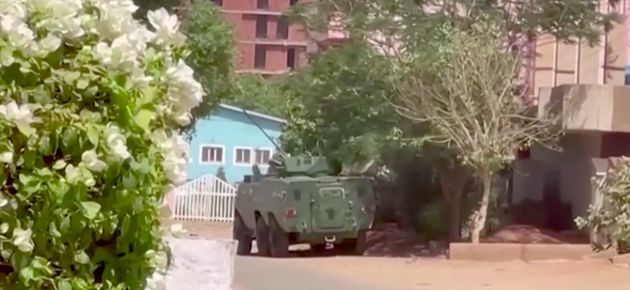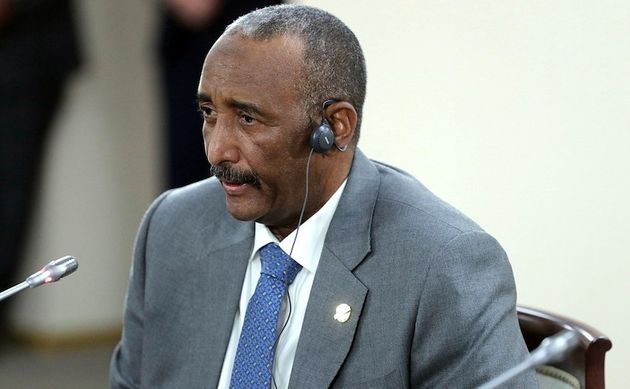‘As long as the military has the upper hand, religious freedom in Sudan is unlikely to improve’
Days after fighting between the army and paramilitaries erupted in Khartoum, 270 people have already been killed and over 1,800 injured.
Protestante Digital · KHARTOUM · 19 APRIL 2023 · 17:26 CET

The overthrow of Omar al-Bashir's regime in July 2019 opened up a scenario full of expectations for many in Sudan, which were dashed with the military coup two years later. Now they have been completely shattered by the latest clash between autocrats for control of the country.
On 15 April, gunfire between military officers of the official forces and paramilitary Rapid Reaction Forces (RSF) flooded the capital, Khartoum.
Since then, at least 270 people have died and another 1,800 have been wounded due to the fighting, according to the WHO.
The motivation for the conflict is a disagreement between probably the most politically influential names in Sudan today: the president of the transitional council, General Abdelfattah al-Burhan, and his vice president, Mohamed Hamdan Dagalo (known as Hemetti).
According to the transition plan, democratic elections were to be held this year in order to bring in a civilian government, but none of the military seems to be in favour of it.
It was also time to set up the new configuration of the army, in order to purge some of the responsibilities of the Darfur War that are still unpunished. And to integrate into a single body the regular army and the paramilitary Rapid Action Forces, elite troops created by Al-Bashir as a personal guard in case his officers rose up against him.
The core of the disagreement between Al-Burhan and Hemetti, one of the country's major fortunes that controls the paramilitaries, has to do with who will control the new Sudanese army.

Setbacks and interests
Before the military displaced the civilian force in the transitional council, Sudan began to experience significant changes in its legislation, especially in relation to the right to religious freedom.
In 2020, the country removed the status os Islam as the official state religion and abolished the death penalty for apostasy. It also announced the normalisation of relations with Isarel.
The 2021 coup d'état, with the removal of much of the government, led to a scenario of uncertainty, while the position of the transitional president and army general, Al-Burhan, was strengthened.
What for many seemed to be a return to the context of dictatorship also increased tensions between the new governmental actors to see who would take power again in the country - a significant international gold exporter that sold around 41.8 tonnes of gold worth 2.5 billion dollars in 2022 alone.
Spanish news website Protestante Digital spoke to Fikiru Mehari, leader of Open Doors' operations in East Africa, about the situation in Sudan. "Christians, who are already in a difficult situation, will face the war with severity because they have no one around to support them", he says.
Question. How is the situation right now in Sudan?
Answer. In the last few hours, it has been reported that reinforcements for the Sudanese army have arrived in Khartoum and that a similar reinforcement for the Rapid Support Forces is on its way from Darfur. So the situation is really concerning.
If these new troops become directly involved in the fighting, this is an indication that the situation is going to turn especially against civilians.
Casualties and military attacks on buildings are high and localities near Khartoum will be in danger.
Fighting between the regular Sudanese army and the Rapid Support Forces, which is a well-trained paramilitary commando, broke out on Saturday morning and since then claims have followed and they have already controlled parts of the city.
People can't even tell because they have been told not to leave their houses, so they have to follow the information from their sources, both the Sudanese army and the Rapid Support Forces.
Q. Why is this escalation of violence happening now?
A. The current situation in Sudan, of clashes between two army groups, has its background. It is not something that surprises the Sudanese themselves, they saw it coming.
The commander of the Rapid Support Forces, Dagalo, and the commander of the regular Sudanese army are rivals as to who will be the leader of the transition and the most powerful when talking about the integration of the military forces in the new configuration.
After 2019, when al-Bashir was deposed, many people were hopeful, including people from neighbouring countries. And also Christians in Sudan. But as time went on we began to see that the military partners in the civilian government became increasingly uncomfortable about ceding power and allowing the civilians to introduce reforms, even though this had been clearly stated in the documents that formed the transitional government.
Then, over time, the military decided that they were not going to allow civilian takeover. So they remained discreet until 2021 and after that they have been in charge of all the country's affairs.
But that opportunity for the military to control the country has its own risk, because the commander of the paramilitary forces, Hemetti, who is a very powerful man in Sudan, was also not happy about allowing Al Burhan to have unchecked power.
So the rivalry between the two men has contributed to the eventual tension that has now reached its peak in resolving their conflict with military power.
The Rapid Support Force was to be integrated into the national army. The commander of that group is not against this idea. But the disagreement comes because Hemetti is suspicious about who will control the new army. Al Burhan has said he will do it himself, and so has Hemetti. So that has led to tensions and eventually also to a conflict to resolve the differences.
Q. There are also economic and international interests involved. Sudan is a major exporter of gold worldwide. How is this affecting the current situation?
A. It is an open secret that everyone knows that the two generals have their own supporters in the region and beyond.
Although we cannot mention specific names, we understand that this kind of foreign intervention cannot be completely ruled out. There is also the local interest of these two men and the generals and commanders behind them.
Although al-Bashir was deposed, the commanders in the army, and Hemetti himself, were handpicked by al-Bashir and grew in rank during his days of leadership and administration. And these people do not seem to be willing to give up their influence in the country, which provides an opportunity for external influence to interfere in the context of the country.
We must remember that Sudan is also an Islamic majority country and the influence of extremism and radicals is still there. Al-Bashir's men and women who worked for his party are still there, even though the party is officially banned. But, in practice, there are still many people from the old regime.

Q. How are the churches in the country facing this situation, especially those located in Khartoum?
A. I have been talking with one of the Christian leaders in the country in the last few days. He was saying that in recent years the people of Khartoum have never experienced anything like military clashes and fighting in the streets.
Previously this was largely confined to the Western part, where Darfur is located, and also to the south and east of the country, but now, right before their eyes, people are dying and they are being asked not to leave their homes. This is affecting daily life. It is a big disruption.
And not only daily life, but some people who urgently need medical assistance are facing difficulties because there is no transport to take them to the hospital.
Some reports say that people have already died because of the lack of medical care due to the situation in the hospitals. Some UN agencies and other international media have also reported that hospitals are also being targeted by the fighting.
The situation in Khartoum is therefore difficult for the residents. And the Christians, who are already in a difficult situation, will face the war with severity because they have no one around to support them, not even their close relatives, so they cannot earn their daily bread.
The situation for Christians is really more difficult, but we are hopeful that if the two generals come to their senses and stop the war, the situation may improve, at least as far as security is concerned.
Q. How will any kind of scenario that comes out of the ongoing conflict affect religious freedom in Sudan?
A. We were in contact with Christian leaders just after Al-Bashir's ouster in 2019 and asked them whether they were hopeful or optimistic about the new setup, which was the transitional government made up in collaboration between civil society and the military.
Back then, they said they were cautiously optimistic. They did not rush to conclude that the situation was going to improve, because they knew their context very well. We understood it, and we prayed for the church and for Christians in the country.
In the current situation, there is no civilian partner. There is no strong trust among Christians to say that whoever wins from the military will be good for them.
Of course, international pressure and student support can change the equation and contribute to improving the right and exercise of citizens. But, according to some of the Christian leaders, as long as the military has the upper hand and the population is not given the right to at least introduce some important reforms, it is really unlikely to have a positive impact on the exercise of the right to religious freedom and other rights in the country.
Christians in Sudan ask for prayer. Whoever the winner is, they pray that the Lord will be on their side and protect them in the face of the worsening situation.
At the moment, one of the main concerns is that the Islamists are preaching the message, again, that democracy is not helping. They say that the democracy called for in the demonstrations is not materialising, so Islam and Sharia is the best way to address their concern.
That is the message they are giving out now, but we are hopeful that the Lord will intervene and stop this conflict so that the situation will be conducive to the exercise of religious freedom.
Q. How can Christians in Europe pray for the church and the situation in Sudan?
A. Prayer is what the church and Christians in Sudan are currently asking for, and it is a great support for them.
Please pray for this war to stop. It is senseless, it is making people suffer. Over 200 people have already lost their lives.
Most of them are civilians losing their lives to crossfire and stray bullets. So please pray that they will come to their senses and stop and start resolving their differences peacefully. And also ask the Lord to really give access and opportunity for the international community to speak directly to these men.
Another thing to pray for is the safety and well-being of Christians in these difficult times. Christians in Sudan have already suffered for a long time for their rights. And every time they claimed the right to exercise their religious freedom, they were mistreated. Some of them were convicted and imprisoned for espionage against their country, which was false.
Christians in Sudan also ask for prayers for those who are struggling to earn their daily bread. Now, people are not allowed to go to work. This will have its effect after a few days. So let us pray for this situation and that they will be kept safe.
Finally, prayer for the future of Sudan. As I explained before, if Islamists are able to get their influence back, that would be really hard for the country.
But not only for Sudan, but actually for the whole region. Sudan is the largest Islamic country in the region, it has a lot of influence on neighbouring countries, it shares borders, ethnicity and language. So it has influence and effect in the area.
Let us pray that the situation will be resolved and that the Islamists will not take power at the end of the conflict.
WEA: “We stand in solidarity with our brothers and sisters in Sudan”
Both entities are “deeply concerned about the escalating violence in the country” and urge evangelical churches around the world to pray “during this difficult time”.
“We stand in solidarity with our brothers and sisters in Sudan who are experiencing the effects of this conflict first hand. We pray for peace to be restored in Sudan, for the safety of all citizens and for the conflicting parties to pursue peaceful solutions to the ongoing crisis”, they add.
They also call on the African Union to work with the international community to “support Sudan in finding a lasting solution to the ongoing crisis and also to address the root causes of the conflict”.
Published in: Evangelical Focus - world - ‘As long as the military has the upper hand, religious freedom in Sudan is unlikely to improve’
Since you are here…
Evangelical Focus is a news and opinion platform that brings together Christians from across Europe and other parts of the world. We need the support of our readers to make this media project sustainable in the long term. You can support our work! Read about Evangelical Focus’s sustainability here.
Would you like to support the work of Evangelical Focus?
Use one of these methods. You can also transfer your donation to “Areópago Protestante / Evangelical Focus” IBAN: ES8521000853530200278394 (Swift / BIC: CAIXESBBXXX). Subject: “Donation Evangelical Focus”
